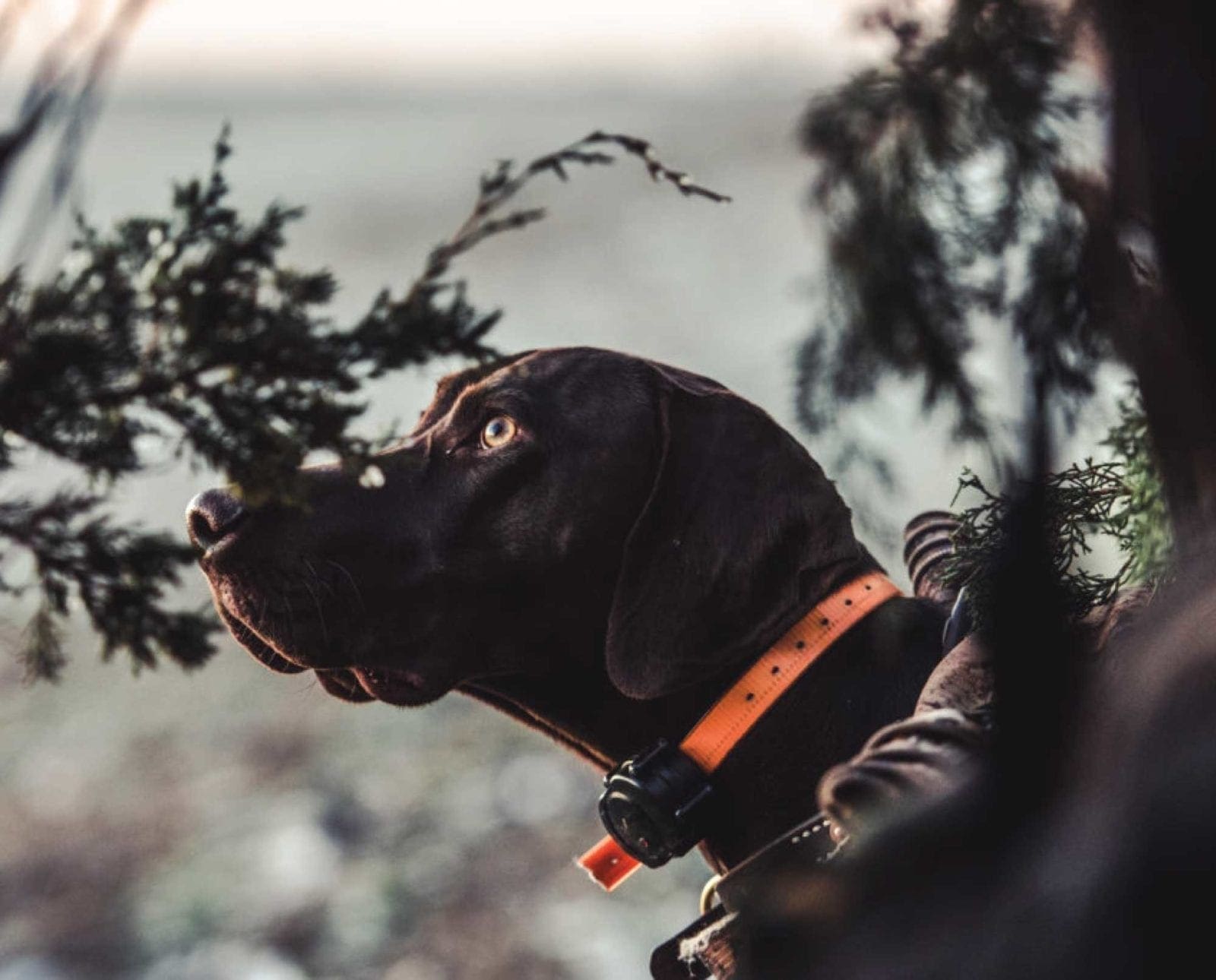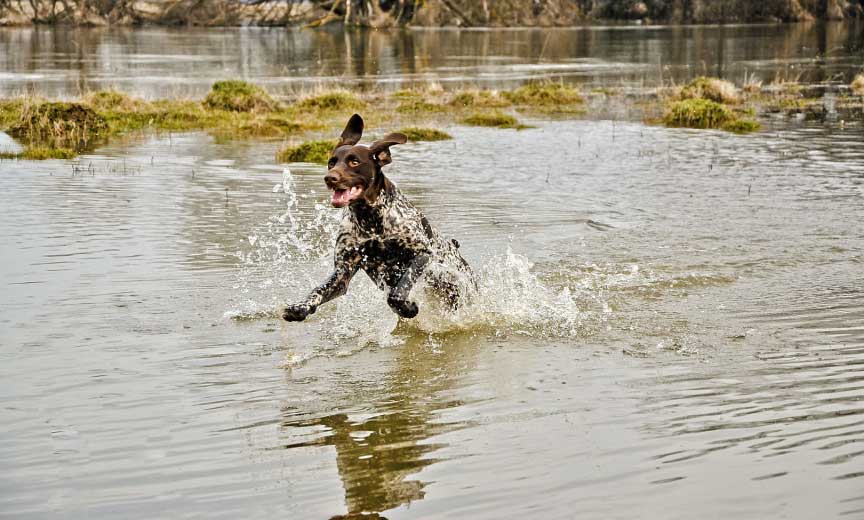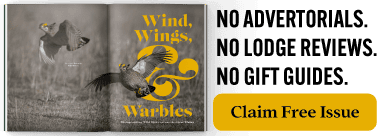Home » Hunting Dogs » German Shorthaired Pointers for Waterfowl Hunting
German Shorthaired Pointers for Waterfowl Hunting

The author explores the versatile German breed’s suitability for waterfowling and various retrieve work
I get a familiar question from clients at least a dozen times each month, “Can you use a GSP for waterfowl hunting?”
The short answer is yes, absolutely. Here at No Limits Kennels, waterfowl is an integral part of our training regimen, from the basics onward, with the German Shorthaired Pointers (GSPs) we breed and train, which range from puppies to veteran hunting dogs.
Yet it seems everyone wants some further clarification, and that is completely understandable. So let’s jump off the deep end together for a moment. German Shorthaired Pointers and many other versatile hunting breeds can be and are extremely well suited for waterfowling and all kinds of retrieving work.
If your question is what is the best breed for waterfowling and retrieving work and that is your sole focus, then I would look no further than a retriever of one kind or another. The misconceptions arise when we are talking about poorly bred or poorly trained dogs. So for the sake of time and sanity, let’s assume you’ve done your homework on breeders and have invested in a dog or puppy from a reputable breeding line.
What it boils down to between breeds is the difference in demands and needs for pure retrieving and versatility. Well-bred Labradors are the most popular and best retrieving dog in almost every retrieving situation and hunting home. German Shorthaired Pointers are the most popular versatile breed and they are the best in almost every versatile situation and hunting home.
There are so many amazing breeders of exceptional sporting dogs in the world today, but probably five times as many poor breeding programs. The most important point to take away: do your research and and make a well-informed decision when purchasing a puppy for your unique needs and situation.
We use our GSPs to guide waterfowl hunts throughout the season as well as to guide upland bird hunts. Our favorable access to a thriving wild bird habitat here in Kansas makes us tried and true lovers of the GSP. We are able to hunt and guide using this breed on a variety of species of wild birds, both upland and waterfowl, going from the duck blind to the spacious pastures searching for quail then back to the goose pit, sometimes all in the same day. Our GSPs have the drive, stamina, mental capacity, and training to do all of these jobs extremely well. Steady in the field or the blind, they are a joy to be around and watch working in unison or solo.

Train hard, hunt easy
Investing in and training a good hunting dog is the same as many aspects of human life that require time and hard work. If you leave your dog in a pen outside or simply just have them living with you, and you don’t work with them to get better or teach them what you would like to have them doing during season, then you are setting yourself and your dog up for failure. We live in a world that is drowning in information but starving for wisdom.
The biggest failure I see in our industry is simply the failure to try.
Steadiness to shot in waterfowl situations and steadiness in the blind are a couple of simple, introductory competencies to teach a well-bred dog that can build a foundation for more complex skills and responses that will serve you in live hunting situations.
One problem that a lot of folks encounter with the GSP breed in particular is that they develop very fast and have a ton of natural instincts to point, honor, and retrieve. That often makes it easy to overlook a lot of the foundational training because many times these dogs learn on the job with experience and little training. The problems arise when the dog is being possessive over a bird or not wanting to bring it back to you and would rather play with it. The easiest way to fix a lot of retrieving problems is generally to solidify recall or the heel cue. Get in touch with your local NAVHDA chapter or trainer that has a proven record with what you are looking to accomplish for help and advice.
People often wonder how the GSP holds up in cold weather and water retrieves. While they cannot withstand the frigid temperatures that a longer-haired dog can, they have the drive to make long icy water retrieves, and most well-bred versatile dogs will do so. When we are hunting over icy or cold water on a winter morning, our GSPs wear easy-to-adjust, fitted neoprene vests to help hold their core temperatures, and we have heaters and towels in the blind for the days we hunt in subfreezing temps in or around water. Many times, though, we hunt large feed fields and are fortunate to have many opportunities to hunt on dry land. Be smart with your dog and know their body language; pull them out at the first sign something is off. That goes for all sporting dog owners out there. Just because they can and will do something doesn’t mean that they should.
These dogs are more than just tools; they are family to most of us. Give your dog the time and training they need to be successful out in the field and remember that you are their only advocate. Dogs are not people. I truly believe that if you show them the time, attention, and structure they need to be the best that they can be, you will not anthropomorphize them and they can live extremely long and happy lives with you. They deserve time and structure and you will see them thrive with those two things and plenty of experience.
The GSPs were bred to be versatile and can really do it all—from finding small birds in tall cover on big tracts of land and pointing them out for us, to retrieving ducks and geese on water and land from our side in the blind. They almost all seem to live to serve and make amazing companions when they have a job. Look around. It’s pretty hard to find someone with a GSP who only has one. From the blind to the field and everything in between, this breed is truly incredible to be around and watch work.




My neighbor leaves his 2 short hairs in a kennel and ignores them and they bark ALL DAY LONG!